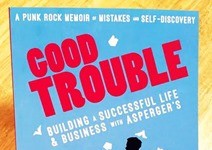The UK’s Futurebook, the digitally-focused offshoot of The Bookseller, has just put up a highly alarming (or conceivably alarmist) headline: “Will you be in the nine percent of publishers that survive?”
Courtesy of social technology consultant, journalist and blogger Suw Charman-Anderson, that headline draws on the experience of former Harvard Business School professor (and more recently, newspaper entrepreneur) Clark Gilbert (pictured below), who is passing on his knowledge via workshops.
“Across industries, only 9 percent of disrupted organizations ever recover. Of those, 100 percent created a separate digital unit to take on the disruption. Not one company Gilbert studied succeeded trying to develop digital inside the existing company.”
Gilbert’s data was derived from news publishing operations, but Charman-Anderson concludes, not unreasonably, that the same argument applies to book publishers. “It is not enough to dabble, to make adjustments here and there, to have a digital-only imprint that’s in all other ways a carbon copy of a print imprint,” she states. “Now is the time for publishers to truly reinvent their own business because the only way to survive disruption is to disrupt yourself.”

For a number of reasons, I don’t agree. The number one reason is that, as already shown here on TeleRead, publishers, unlike booksellers, have finally worked out that the economics of e-book publishing are not actually that bad for their bottom line, even given the cut they have to give up to Amazon or Apple. Publishing electronically allows them to keep print runs short, tailor releases, and generally box clever in ways that aren’t exactly digitally disruptive but are certainly savvy uses of the new platform capabilities.
Fine, this may be a question of them belatedly and reluctantly getting the message, but it doesn’t appear to be wholesale self-disruption either. Piecemeal and halfhearted change still seems to work when the economics are that good.
The other reason is that publishers, again unlike bookshops, don’t really have a fundamental structural problem with e-book publishing. With their printing operations long outsourced to third parties often a world away, their physical distribution and even promotion often in the hands of independent providers, they are free to focus on being talent development and marketing houses. Digital disruption doesn’t contravene that.
So I’m not persuaded of the merits of the case. I am persuaded, though, that Futurebook likes the kind of alarmist headlines that keeps the more impressionable readers nervous, and more ready to back Futurebook’s own training and other initiatives.



































Isn’t it 91% of publishers?
Paul, would you say you are good at math?
LOL oops! Busted for mathslexia!
Paul, the bulk of your argument seems to be that publishers are getting to grips with ebooks so therefore they don’t have to worry about anything else. I think that’s putting more faith in ebooks than they deserve, because firstly, ebooks are not the only kind of new product that publishers should be creating, and secondly transformation must run deeper than just adding a new format to the portfolio.
The disruption that publishers are facing is not coming solely from the invention of the ereader and the migration of some readers to digital content. Publishers are also competing for attention with other forms of entertainment, and the competing for authors with self-publishing, to name just two aspects. Producing ebooks is not a sign of transformation, it’s the very bare minimum that publishers should be doing.
What about using collaborative tools to streamline the book production process to bring books to market faster? And accounts tools that allow for royalty payments to be made to authors monthly instead of every year or two? And up-skilling everyone across the business to understand social media and digital marketing? What about innovative digital products that allow the reader to immerse themselves in the work of authors they love? A lot of publishers still think their customers are the wholesalers and retailers, not the readers, and that’s the kind of fundamental mistake that can doom them to irrelevance.
The headline is, sadly, not alarmist at all. I’ve not seen a single persuasive argument as to why Clarke’s work – which produced evidence so compelling that he said arguing against it was like arguing against gravity – does not apply to publishing. I do not see how publishing is so very different to the news industry, nor do I see that publishing is doing anything particularly groundbreaking in terms of dealing with digital transformation.
In fact, what I’ve mostly seen is resistance to change and an impatient dismissal of the problem, which is a surefire way to ensure that by the time people actually wake up it will be too late.
As for your insinuation that my post was written just to encourage people to engage with Futurebook’s training or other initiatives, I’ll be polite and say that that is inaccurate. I have no involvement in their training and I have no vested interest in it. I write on Futurebook whatever I think is relevant, without any editorial pressure from the Bookseller one way or another.
I would like to ask, though, what is your motivation for ignoring good, solid evidence that has been gathered by very well-respected researchers? How can you seriously say, in response to that evidence, that transformation doesn’t matter because, well, ebooks?
LOL oops redux! Looks like Paul’s editor got busted for mathslexia as well. D’oh!
(Embarrassing subtraction error corrected, btw. Paul and I are both wearing hair shirts today, Jeff, if that makes you feel any better. Very uncomfortable, incidentally.)
Apologies for the insinuation, Suw. And given the embarrassing maths slip it came with, I doubt anyone took it too seriously anyway.